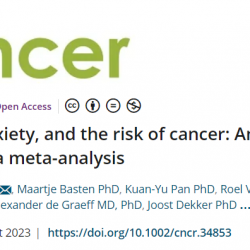Authors: Kuan-Yu Pan , Lonneke van Tuijl, Maartje Basten, Judith J. M. Rijnhart, Alexander de Graeff, Joost Dekker, Mirjam I. Geerlings, Adriaan Hoogendoorn, Adelita V. Ranchor, Roel Vermeulen, Lützen Portengen, Adri C. Voogd, Jessica Abell, Philip Awadalla, Aartjan T. F. Beekman, Ottar Bjerkese, Andy Boyd, Yunsong Cui, Philipp Frank, Henrike Galenkamp, Bert Garssen, Sean Hellingman, Monika Hollander, Martijn Huisman, Anke Huss, Melanie R. Keats, Almar A. L. Kok, Steinar Krokstad, Flora E. van Leeuwen, Annemarie I. Luik, Nolwenn Noisel, Yves Payette, Brenda W. J. H. Penninx, Susan Picavet, Ina Rissanen, Annelieke M. Roest, Judith G. M. Rosmalen, Rikje Ruiter, Robert A. Schoevers, David Soave, Mandy Spaan, Andrew Steptoe, Karien Stronks, Erik R. Sund, Ellen Sweeney, Alison Teyhan, Emma L. Twait, Kimberly D. van der Willik and Femke Lamers. Journal: Psychological Medicine Abstract: Background – Although behavioral mechanisms in the association among depression, anxiety, and cancer are plausible, few studies have empirically studied mediation by health behaviors. We aimed to examine the mediating role of several health behaviors in the associations among depression, anxiety, and the incidence of various cancer types (overall, breast, prostate, lung, colorectal, smoking-related, and alcohol-related cancers). Methods – Two-stage individual participant data meta-analyses were performed based on 18 cohorts within the Psychosocial Factors and Cancer Incidence consortium that had a measure of depression or anxiety (N = 319 613, cancer incidence = 25 803). Health behaviors included smoking, physical inactivity, alcohol use, body mass index (BMI), sedentary behavior, and sleep duration and quality. In stage one, path-specific regression estimates were obtained in each cohort. In stage two, cohort-specific estimates were pooled using random-effects multivariate meta-analysis, and natural indirect effects (i.e. mediating effects) were calculated as hazard ratios (HRs). Results – Smoking (HRs range 1.04–1.10) and physical inactivity (HRs range 1.01–1.02) significantly mediated the associations among depression, anxiety, and lung cancer. Smoking was also a mediator for smoking-related cancers (HRs range 1.03–1.06). There was mediation by health behaviors, especially smoking, physical inactivity, alcohol use, and a higher BMI, in the associations among depression, anxiety, and overall cancer or other types of cancer, but effects were small (HRs generally below 1.01). Conclusions – Smoking constitutes a mediating pathway linking depression and anxiety to lung cancer and smoking-related cancers. Our findings underline the importance of smoking cessation interventions for persons with depression or anxiety. doi: DOI: https://doi.org/10.1017/S0033291724000850



